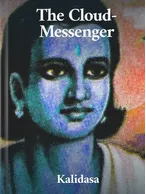The Cloud Messenger, a Timeless Tale of Love and Longing

Discover The Cloud Messenger—Kalidasa’s timeless poem of love, longing, and nature, where a cloud carries the message of a broken heart.
A Message Carried by the Clouds
Nature Reflects the Heart
A Poetic Journey Through Ancient India
Did You Know?
Why Read The Cloud Messenger?
Final Thought
The Cloud Messenger (Meghadūta) by Kalidasa is one of the most beloved poems in classical Indian literature.
Written more than 1,500 years ago, this lyrical work tells a heartfelt story of love, separation, and the hope of reunion.
Though ancient, its emotions—longing, memory, and devotion—still feel close to our own lives today.
A Message Carried by the Clouds
The story begins with a Yaksha, a divine being who has been banished by his master, Kubera, the god of wealth, for neglecting his duties.
He is forced to live alone on a remote mountain, far from his wife in the distant city of Alaka, nestled near the Himalayas.
As the monsoon arrives, he sees a rain cloud drifting through the sky.
Moved by sorrow and hope, he asks the cloud to act as a messenger and carry his message of love to his wife.
Mid streams by Sita’s bathing sanctified,
An erring Yaksha made his hapless home,
Doomed by his master humbly to abide,
And spend a long, long year of absence from his bride.

Nature Reflects the Heart
Kalidasa uses the journey of the cloud to describe not only geography but emotion.
The rivers, trees, temples, and towns the cloud must pass through are not just landmarks—they mirror the Yaksha’s feelings of longing, beauty, and quiet suffering.
My bride is far, through royal wrath and might;
Bring her my message to the Yaksha city,
Rich-gardened Alaka, where radiance bright
From Shiva’s crescent bathes the palaces in light.

In this way, nature becomes part of the poem’s emotional language. The cloud itself turns into a symbol of patience, hope, and connection.
A Poetic Journey Through Ancient India
As the Yaksha guides the cloud, readers are taken on a tour of ancient India—from the lush Vindhya forests to the sacred city of Ujjayinī, from the rivers of Madhya Pradesh to the peaks of the Himalayas.
Kalidasa’s descriptions are rich, painting each place with color, spirit, and feeling.
This journey becomes both physical and emotional—a path not only across land, but across memory and desire.
Did You Know?
- Kalidasa is considered one of the greatest Sanskrit poets, often called “India’s Shakespeare.”
- Meghadūta is one of the earliest examples of messenger poetry, a genre where a character sends a message through nature.
- The entire poem is written in mandākrāntā meter, known for its flowing, musical quality—perfect for conveying slow, steady longing.
Why Read The Cloud Messenger?
- It’s a poem about love that endures even in silence and distance.
- It gives you a window into ancient Indian culture, geography, and storytelling.
- It’s written with grace, emotion, and a deep respect for nature.
- It invites you to feel, not just read.
You can enjoy the full English translation of The Cloud Messenger for free at WholeReader, translated beautifully by Arthur W. Ryder.
Final Thought
If you’ve ever missed someone,
If you’ve ever hoped your feelings could travel to them like a breeze,
Then this poem is for you.
The Cloud Messenger is not just a love story—
It’s a song of the sky, a quiet voice carried by the wind,
Reminding us that love, once spoken, never truly disappears.
📖 Let Kalidasa’s words drift into your heart—softly, like a monsoon cloud.
